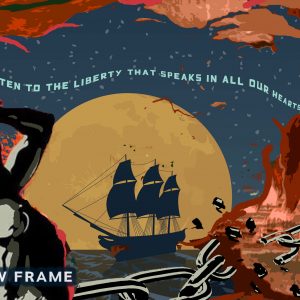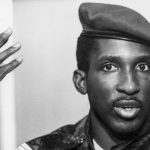A promising move against impunity
It may have taken 34 years, but the decision to bring the murderers of Thomas Sankara to book is an important warning to assassins and their backers.
Author:
16 April 2021

On Tuesday, a military tribunal in Burkina Faso charged former president Blaise Compaoré with complicity in the assassination of Thomas Sankara in 1987. This is a potentially significant development.
Every effective attempt in the modern world to create or restore the autonomy of African polities has met with serious resistance. On New Year’s Day in 1804, after more than 12 years of war, the Haitian Revolution triumphed and declared the first Black republic. The rebel republic was immediately isolated and, much like Cuba today, prevented from engaging in international trade.
In 1825, France anchored 14 war ships equipped with 528 canons off the coast of Haiti and demanded the Haitian state pay 150 million gold francs in “reparations” to former slaveholders in order to be granted political recognition and an end to economic isolation. The debt was reduced to 60 million francs in 1838. When it was finally paid off in 1947, the amount that had been paid to France was $21 billion in today’s terms.
Haiti is still denied autonomy today. Former president Jean-Bertrand Aristide was removed from office by a United States-backed coup in 2004, the year of the bicentenary of the Haitian Revolution, and Haiti continues to be politically subordinated to the US.
Related article:
In 1862, during the American Civil War, Abraham Lincoln issued the Emancipation Proclamation, which declared that on New Year’s Day 1863 more than 3.5 million people enslaved in the secessionist Confederate states would be free people the moment they escaped the Confederacy. This followed what the great American intellectual WEB du Bois called the general strike, during which half a million enslaved people escaped the plantations, with many joining the Union army.
At the end of the Civil War, a Reconstruction programme in which formerly enslaved people organised and mobilised people to play a central role attempted to build an inclusive democracy. It ran from 1865 until 1877 and made significant progress. But as white revanchism organised itself politically and reconstituted its capacity for organised violence, including through the Ku Klux Klan, the gains were reversed and a new regime of racial terror created. As the continuing police murders of African Americans show, it has yet to be fully undone.
Torture and death
In the African colonies, rebellion was frequently met with massacre. The struggles that followed World War II were marked by harrowing violence. The British subjected the Kenya Land and Freedom Army, also known as the Mau Mau, to horrific forms of torture and hundreds of thousands of people were interned in concentration camps.
The highest price for freedom was paid in Algeria, where between 700 000 and 1.5 million people lost their lives and more than two million were forced from their homes. Torture was pervasive.
The new states that emerged after colonialism were immediately hemmed in and contained. Patrice Lumumba, the first prime minister of the independent Democratic Republic of Congo, was assassinated after just more than two months in office. The US state was directly involved in the assassination through the Central Intelligence Agency (CIA).
Related article:
The assassination pushed the new state into a deep and systemic crisis in which a small elite, allied to Western economic interests, profited at the direct expense of the majority, who remain subjected to continuing cycles of violence and general catastrophe. By 2008, the Second Congo War and its aftermath had cost more than five million lives and resulted in more than two million people being displaced.
The CIA was also involved in the arrest of Nelson Mandela in Howick in 1962.
Money as a weapon
By the 1980s, debt – this time organised through the World Bank and the International Monetary Fund (IMF) – had returned as a key instrument of control. Loans, often taken by hugely corrupt dictators, with former Congolese president Mobutu Sese Seko being among the worst, were used to force states to implement “structural adjustment” programmes that effectively put an end to national sovereignty and forced public funding to be slashed.
Along with cuts to healthcare, schools, infrastructure and more, universities were subjected to such severe spending cuts that intellectual autonomy was severely compromised. There were deliberate attempts to replace critical engagement with training for Africans to be subordinate partners to imperial research interests, undertaking only technical work. Large numbers of university-trained intellectuals either moved abroad or began to work for Western institutions, ranging from the World Bank itself to non-governmental organisations and donors.
Related article:
In many countries across Africa, attempts to build alternatives from below through trade unions, grassroots organising and student rebellions have been repressed with severe state violence – including beatings, imprisonment, torture and murder.
Thomas Sankara, who had come to power through a coup, served as president of Burkina Faso from 1983 until 1987, when he was assassinated at a meeting in which 12 other people were also murdered. The assassination was immediately understood to have been instigated by Compaoré, who was an army captain at the time. After the assassination, Compaoré stated that Sankara had placed relations with France, the former colonial power, at risk.
Progressive and committed
Sankara, who was inspired by Fidel Castro and Che Guevara, mobilised the people and pursued an extraordinary social programme. There was spectacular progress in literacy, housing and healthcare – more than two million people were vaccinated with the aim of eradicating measles, polio and meningitis.
More than 10 million trees were planted, and there were major agrarian reforms and a commitment to what is now called food sovereignty. Sankara’s government was the first in Africa to take the Aids pandemic seriously.
There was an unparalleled commitment to affirming women’s autonomy, social standing and power. Women were appointed to high positions in significant numbers and encouraged to participate in life beyond the home – in school, work and political activities – independently from fathers and husbands.
Related article:
Forced marriages, female genital mutilation and polygamy were all banned and access to contraception strongly supported. On International Women’s Day in 1987, Sankara announced an explicit commitment to “upsetting the relations of authority between men and women”.
Sankara did not come to power through democratic means, but the achievements during his period in office are undeniable, as is the fact that, after his assassination, Compaoré moved rapidly to subordinate the country to France, the World Bank and the IMF.
Across the continent, predatory states and political elites, many of which are in alliance with Western economic and political interests, have continued to repress popular dissent through various means, including assassination. Ken Saro-Wiwa, an environmental activist and public intellectual, was executed in 1995 by the military dictatorship in Nigeria, which was closely allied to Western oil companies.
State violence
Here in South Africa, the police regularly kill people during street protests. Striking miners have been massacred and a long list of grassroots activists assassinated. Attempts to build popular autonomy, democracy and power from below remain perilous.
From Haiti to Latin America, it is clear that governments are only able to attain more autonomy than is usually granted by imperialism when they are driven and backed by popular organisation. Every time grassroots organising is repressed, that possibility recedes.
This is not solely a matter of African elites forming alliances with Western political and economic elites. In South Africa, assassinations are often driven by rent-seeking local actors who are independent of imperial interests. In many cases the murder of anti-mining activists is an important exception to this.
It will not be possible to open a new emancipatory horizon in Africa if we cannot put an end to repression and attempts to resolve political conflicts through violence. This requires, among other things, an end to impunity for all forms of political repression and violence, including assassinations. For this reason, the move to bring Compaoré to justice is a significant moment. We need similar progress here at home.
We can no longer accept the situation in which, in the words of the great Martinican poet Aimé Césaire, “we shall be the prey and the vulture”.




